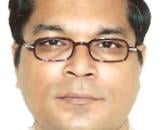
Female fertility declines with advanced age
►Natural conception rate in the female declines substantially from the age of 30 years and the decline is more marked after 34. Similar declining trends are seen in the success rates of all the treatment for infertility including In-vitro Fertilisation (IVF)* and donor insemination (DI)** treatment in relation to advanced female age. The possible reasons for the decline in female fertility with advanced age include primarily an ageing egg (oocyte)*** that might be associated with mitochondrial dysfunction and an older womb (uterus).
*In-vitro Fertilisation (IVF) – It is popularly known as test-tube baby, where the eggs are fertilised by the sperm in the laboratory and outside the woman’s body. The fertilised eggs (very early stage of the babies) are then allowed to grow in culture media and then two (or one) of them are (is) transferred to the woman’s womb at a suitable stage of their (its) development. IVF is usually the last option to have a biological baby when all other treatment measures have failed.
**Donor insemination (DI) – It is an Artificial Reproductive Technique (ART) where a donor’s sperm is introduced inside the vagina (front passage), cervix (neck of the womb) or uterus (womb) in presence of severe male problem (where the husband /male partner do not have enough/any good quality sperm).
***Ageing of the egg changes nuclear and cytoplasmic competence, affecting cell division (spindle formation and chromosome segregation), mitochondrial function and the integrity of the cytoskeleton. A poor-quality egg is less likely to be fertilised and, if fertilised, would produce a sub-optimal embryo that would divide slowly and would be unlikely to implant leading to failure of conception to occur.
Reproductive ageing of men has an impact on their fertility and the health of the offspring as well. The reproductive impact of paternal ageing is less prominent than that of female ageing but is at least partly responsible for the association with reduced fertility and the increase in pregnancy related complications and adverse outcome in the offspring. Men over 40 years of age contribute to reduced fertility and fecundity, especially when the female partner is also of advanced age. Increasing paternal age might be associated with sub-optimal semen quality (volume, motility and morphology), sub-optimal DNA integrity of sperm (with possible epigenetic effects), low serum androgen concentration, reduced sexual activity, altered testicular morphology etc.
The life-time chances of remaining childless increases with advanced female age. The later in life the woman starts to try for pregnancy the chances of remaining childless increases proportionately.
The risk of being childless doubles if the woman
starts to try for pregnancy after the age of 34
(30% compared to 15% between 30-34)
It doubles again if the woman starts to try for pregnancy after the age of 39 (60% compared to 30% between 35-39).
The rate of remaining childless increases by about 66.67% if trying for pregnancy is delayed from 20-24 years to 25-29 years. The rate increases by about 50% between 30-34 years, then doubles (100% increase) between 35-39 years and doubles (100% increase) again between 40-44 years. Therefore, the rates of increase remain similar up to 30-34 years, but increase sharply after 34 years. Women should consider this fact if they plan to delay childbearing.
These rates of remaining childless reflect the rates of natural conception without any treatment. The rates would be lower if appropriate treatment of infertility is undertaken earlier.
Continued in Female Fertility and Ageing - Part 2
Further information: For better insight you could check the Figures and Tables (that could not be included in the blog) in the book "Infertility - A Growing Problem The Facts and Solutions" by Dr Sudipta Paul, Dey Publications, Kolkata.

Comments should be on the topic and should not be abusive. The editorial team reserves the right to review and moderate the comments posted on the site.